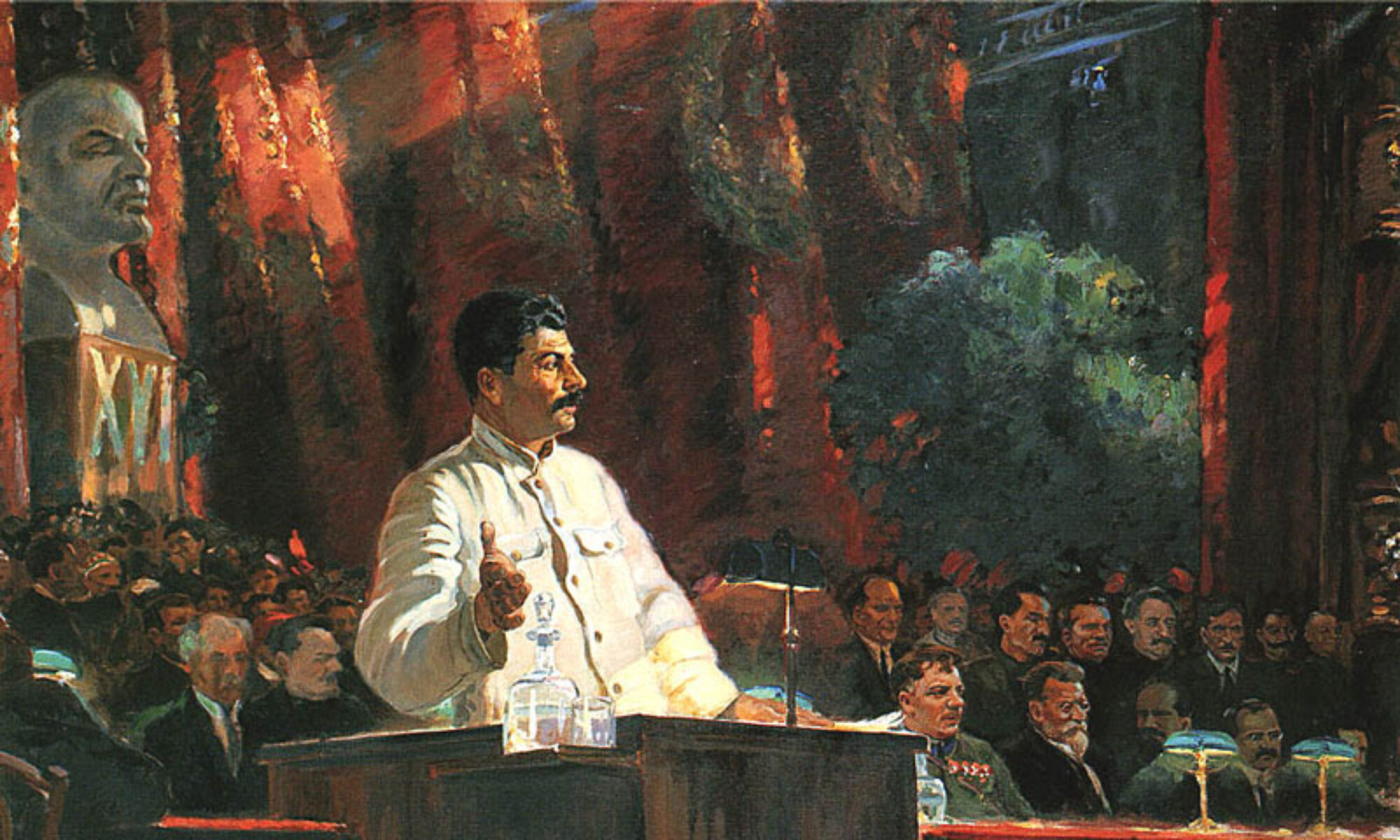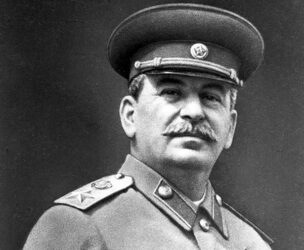The movie opens with a scene that resembles the end to a romantic comedy, with the happy couple skipping off into the sunset. This sets the stage for a cute young love story, but instead the couple is ripped apart by war. Squirrels in a sad marriage to a man that took advantage of her when she was in need of someone to hold her up. Why does the movie open with such a loving scene of this couple just to tear them apart? Do you think this had something to do with support for the party?
The Power of Will
Podlubnyi believes very strongly in willpower. His most passionate fear is that he is weak-willed, and that is the worst possible trait to have as a Soviet Man.
“By the way about the news that Mama reported: an incredible famine is going on over there. Half of the people have died of hunger. Now they are eating cooked beet tops. There are plenty of cases of cannibalism. . . . All in all it’s a terrifying thing. I don’t know why, but I don’t have any pity for this. It has to be this way because then it will be easier to remake the peasants’ smallholder psychology into the proletarian psychology that we need. And those who die of hunger, let them die. If they can’t defend themselves against death from starvation, it means that they are weak-willed, and what can they give to society? (pg. 102)”
In this quote Pobdlubnyi rationalizes the famine and the deaths of thousands. He says this on the basis that if they had stronger willpower they would survive. He even goes so far as to say that if they are so called “weak-willed”, they have nothing of value to contribute to society. Do you think that if other citizens knew of the famines they would agree with Podlubnyi’s point of view? Now that we know some people knew of the famines, do you think they stayed quiet because they agreed with people like Podlubnyi, or because they were afraid to express their opinions? And lastly, do you agree in any way with Podlubnyi?
A Difference in Perspective
In Pasha Angelina’s writing she is proud of everything she accomplished, but never takes the credit. All of the credit for Pasha’s work is given to Stalin. She has both a street and a large ship named after her, so why do you think she gives all of the credit to Stalin and the country? “Sometimes I hear the words celebrated and famous attached to my name. In deed, the government has honored me with prestigious awards and high titles. There is even a Pasha Angelina Street in the city of Stalino, and a Pasha Angelina ship on the Moscow Canal. I treasure and appreciate all this very much. To be famous in our country means that your work has received the highest recognition from our people. This kind of fame brings great happiness and uplifts the soul! I would like, however, to emphasize the following: whatever is being said about me is, first and foremost, praise for my country.(317)” Millions of people died during the time that she found the most success, and the people that were lost died because of the man she attributes all of her success too. Do you think Pasha is unaware of the tragedies around her? Do you think that she would have attributed so much success to Stalin had she known?
“Here I would like to say a few words about a man who raised my whole generation, a man whose name is associated with everything that is good in your lives and mine, with all our hopes for the future-about Stalin.(316)”
What did Pasha mean by a man who raised her whole generation? Was Stalin’s name really associated with everything that is good in everyones life?
The Real Stalinist Experience
At the beginning of the story from Arina’s Children, Chapter 15, page 221, the narrating girl says, “My father became the best hunter in the kolkhoz, and my mother, the first shock-worker. Nobody worked harder than she did. No other family had as many labor days as we did. That’s when some people started envying us and wishing us ill–people, like Bugarikha, who pretended to be activists but only liked to talk, not work.” so when her family is exiled, she does not understand why. Although the political system has nothing to do with the young girl, it will change her life forever. Dekulakization was running rampant through the Soviet Union, and her parents knew it was coming to the village. Although they had many kids, they had been working so hard for many years that they believed that they would be protected. Do you think the bewilderment and fear that this young girl is feeling are entirely the fault of her government, or does any of the responsibility of her parents for not taking any of the warnings?
Hujum
The Hujum was a movement for Central Asian Muslims and Caucasus in order to more easily integrate them into soviet life and the workforce. Using equality laws, literacy programs, and bringing women into the labor force, the Communist Party leadership in Moscow launched the campaign. The main way of supporting the campaign became unveiling of the women’s paranji’s, and although this was meant to be a nonviolent practice, it quickly took a turn. Women who unveiled and showed support were in danger of being assaulted or killed. Rabhar-OI said, “And there was that actress. She was Halima’s understudy. Her husband bit off her nose, just like that”(pg. 159) this was meant to force the woman put her paranji back on. Would you take a risk the way these women did for something you cared about? What would you do if your spouse disagreed?
A view of Stalin through art
The “Cult of Stalin Slideshow” presents many paintings and photographs of Stalin. In most of the paintings he is the main focal point, although he is not always in the center of the photo. It is important to point out that there is very limited racial diversity in these paintings. In each of the paintings from 1930, all of the people in the background and surrounding him are white males. In the paintings from 1950 and 1938, Stalin is not an obvious focal point, and all the people around him are white. Propaganda posters are also majority people of caucasian descent. Do you think this was intentional? Do you think that this is relevant with the message about Soviet’s being an all accepting people?
Rodchenko
Alexander Rodchenko could be considered one of the most effective modern reporters to show all of the details of a gory situation, and manipulate the people to only care about what it has achieved. He spent two years photographing the White Sea-Baltic Canal construction. The construction of the canal involved a prison camp and forced labor. When his all-inclusive inside look was printed, he ensured that it highlighted the amazing innovation and how the prison camp transformed societal outcasts. The article captioned, “The attack on the land took place with spades and explosives, iron and fire!”(pg. 170). He made the construction process out to sound like a war zone. Do you think this manipulation of a cruel situation happens in the current political world? Do you think people realize when an article like this is presented?
Shostakovich
Shostakovich, although a determined and avid composer was not to be pitied. He was strongly criticized for his work, although he can not be considered a trailblazer. He never strayed from the Marxist-Leninist aesthetic. He stated, “I consider that every artist who isolates himself from the world is doomed. I find it incredible that an artist should want to shut himself away from the people who, in the end, form his audience. I think an artist should serve the greatest possible number of people. I always try to make myself understood as widely as possible, and, if I don’t succeed, I consider it my own fault.” He blames the opinions of the public on himself. I personally disagree with his statement. I think he was ahead of his time, and the only reason his failures were critiqued so harshly was the political climate and country that he released them in. Do you believe that Shostakovich was right in taking the blame for his failures, or is it deeper than this?
This information is from Music and Musical Life in Soviet Russia pages 109-140 by Boris Schwarz
Circus: Pro feminism?
In the film Circus, directed by Grigori Aleksandrov, it begins with a white woman in the United States being chased because she has a bi-racial child. She flees to Soviet Union, where she begins her job as a circus performer. Eventually the people find out she has a bi-racial child, but instead of trying to exile or imprison her, she is welcomed and told that her child would be loved by all.
This film was made as propaganda to get people, most likely black people to immigrate to the Soviet Union. I examined a different issue to that of race. I found it interesting, because she is a single mother, that she does not face any extra hardship. In the United States, it was not widely socially acceptable to be a single mother until the early 1990’s, and some could say that is pushing it. Is this because the Soviet Union was a more pro feminist country, or just because this movie was mainly propaganda for those living outside the Soviet Union?
Life and Work Ethic
Pavel cares most in life about working hard, and doing what he can for his country. He is severely depressed when he realizes he is paralyzed and will be an invalid. On page 433, he states, “Man’s most precious possession is life itself… and one should make haste to use every moment of life, for after all an illness or accident may suddenly cut it short.”(Ostravsky) He values his work as the single most important part of his life. He works endlessly to find a way to support his country, while being told countless times that he is to stop working. He even considered ending his life, but decided against it as he had not employed every last option. He always manages to find a way, even in his complete blindness with only the ability to move his right hand, he wrote a manuscript. Should the credit for his perseverance be given to himself, or to the Soviet society that he holds so dearly?

